|
Limba
romana

Program "In PROfunzime" ("In-depth") by Lorena Bogza
21 September 2003, 19:45
The key is to develop sound economic policies
Interview with
Edgardo Ruggiero, the IMF Resident Representative in Moldova


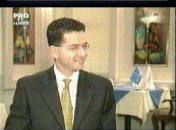
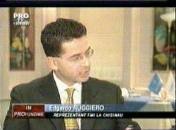

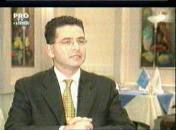
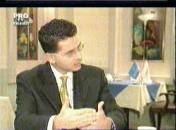
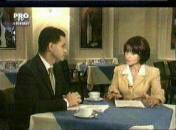
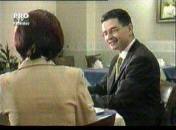
Mr. Ruggiero, what is the IMF and why does it give us
money?
You can think of the IMF as a credit union, which means
several countries put their money together to create a larger amount of money
and give it to other countries. Thatís the main thing we do Ė lend money. But we
also do other things Ė we give technical assistance, we help countries develop
their banking systems, the fiscal systems. We also do surveillance, we help
countries to monitor their economic policies.
Why do we give money to Moldova? We offer money to Moldova
on concessional terms Ė at a very low interest rate of 0.5%, for 10 years and
with 5.5 years grace period. This is very cheap money which helps the country
get out of debt. The main reason we give money to Moldova is to implement
economic programs that help the poor.
IMFís administrative expenditures (salaries, premises
maintenance) account for hundreds of millions of dollars annually. Nevertheless,
the Fund is considered to be a profit making institution. Where the extra money
come from?
Itís a difference between the interest income and interest
costs. We borrow money from the member states and then we have to pay interest
on these loans, but when we lend money we also get an interest income. And keep
in mind, even though we lend money to Moldova at a very low interest rate,
because itís a poor country, we give money at market interest rate to other
countries, so we have an income from the lending activity and that difference
finances our operational expenditures.
Now we are not receiving credits anymore because the
government did not honor some conditions, among them being implementation of
Pre-Shipment Inspection (PSI). Why is PSI so important?
You see, the PSI is important but itís not the only reason
why the IMF did not give money to the Government this time. Itís just one of the
conditions and I think it was overblown. They gave too much importance to this
particular aspect. One thing people are not very aware of is that the PSI that
we agreed with the Government now - last time we were here on mission - is
completely different from previous PSI. It is much more convenient for the
Government and for the importers. We excluded a number of items, a number of
goods coming into the country were not part of inspection services, we have
decreased the threshold.
Why it is so important? Because through customs there is a
lot of smuggling. Customs administration, as you know, is not working very
well. For some people itís easy to come in and not pay customs duties and for
others itís very difficult, and they have to pay very high duties and sometimes
on the side. So itís very important to improve the ability of customs to work.
And PSI was always an interim solution.
Why is IMF insisting that PSI must be implemented by SGS?
This was always a misperception. In the area of PSI there
were two main misperceptions: 1. We never insisted on SGS. We insisted on ONE
company; 2. We always agreed with the Government that there will be a PSI and
the Government agreed with us!
We insisted that there will be one company because for the
size of Moldova you can not have two companies, it makes no sense. If you have
two companies the PSI will not work, they will be in competition and they will
not do a proper job.
Former Prime Minister Ion Sturza told us in the previous
program that negotiations with IMF are tough, sometimes humiliating, and that
during the decision making process on resumption of funding the IMF is also
taking into account the political factor in the country. Your comment?
Well, I do not know if they are humiliating. They can be
humiliating for both parties as sometimes whenever there is a negotiation, even
in your family, with your husband or your friend, it can sometimes be
humiliating. You have to accept things. But the important thing is that for
both parties these are tough negotiations, not only for the Government.
When the Government negotiates with us, once the agreement
is reached they have to convince the Parliament and when we go back to
Washington we have to convince the other Departments and Executive Board that
this agreement is a good agreement. So we are both in a difficult situation and
therefore both under pressure. And when people are under pressure, different
situations happen - but that is normal.
As for the political factor: for us the fact that Moldova
has a communist government means nothing. We do not look for the color of
Government, for the color of Parliament, we look at the economic policies.
During a meeting with students on Sep-12, President
Voronin said that he is glad that Moldova has not received the credits. Your
comment?
I was not there when Voronin was speaking and also my
understanding is that the journalists were not supposed to be there when he was
speaking, so I do not know. May be it was quoted out of context, I do not know
what he was saying.
Can Moldova live without external financing or not?
There are very few countries that live without external
credits. But every country can survive without external credits. It depends on
the choices for the country. Moldova in this particular time needs credits. Do
they need credit from the IMF? Not necessarily. They can get it from many
different countries, from many different donors, provided that they implement
good economic policies.
What are the consequences of lending suspension for
Moldova? What should we expect?
You can expect tighter fiscal policies, more expenditure
restraints on the side of the Government. They will have to spend less money
because they do not have external financing, they have not received the
privatization proceeds that they were expecting.
Each ministry will have less money to spend, and the
government will not be able to cut some taxes, as they thought six months ago.
On the contrary, some taxes may go up.
We all saw that happened in Argentina. What chances are
that we fall into the same situation?
Itís a completely different situation. Argentina had a
fixed exchange rate and that created a problem for them. Moldova does not have a
fixed exchange rate it has a floating exchange rate.
Well, this happens when Government borrows to finance
current expenditures not investment, pays salaries, finance salaries before
elections, or increase pensions before elections and when the investments that
are made are not productive investments so the country does not grow.
How and where a state is declared in default? Voronin
also said that Paris Club, through which Moldova has hoped to restructure its
debt, is a trap. He said that later, when the maturity expires, weíll have to
pay higher interest payments. Is that so?
Well, itís a misrepresentation of what the Paris Club is.
Paris Club is where your creditors are and they decide that you have done good
economic policies. If you do not have enough money to pay these creditors now,
they might agree that you will pay them back very soon. So, your debt is simply
postponed - you pay later. But not at higher interest rate, thatís for sure. But
in some cases in the contents of Paris Club if economic policies are very good
there is naturally debt reduction.
At present Moldovaís external debt is $1.3bn. We would
like to point out that immediately after Moldovaís declaration of independence
there were no debts to anybody. How did we end up like this? (The government at
power is accusing former governments for indebting Moldova up to its neck,
through the obtained loans. Does IMF verify the way money are used?)
At this point what the Government is doing and I think itís
the right thing to do now - is to think about the economic policies and what
economic policies they want to implement. We will discuss the policy at the end
of October - early November when the IMF mission will come here. And then next
year we will come back and see if these economic polices are good to give our
Executive Board members enough security that we can lend again on concessional
terms, at very low interest rate, to Moldova. So, the key is to develop economic
policies, own economic policies, to give us enough security that the economy
will do well for the next few years.
Thank you very much. |